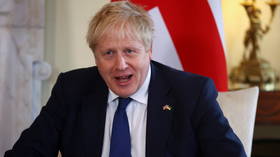British Cycling suspends trans participation policy

British Cycling has suspended its current policy on transgender women participation which means that such athletes no longer have the right to compete in elite female events until new legislation has been introduced.
The suspended policy dictated that riders needed to have maintained testosterone levels below five nanomoles per liter over a 12-month period prior to competition.
But, amid a controversy involving the trans cyclist Emily Bridges who was ruled ineligible to compete in the National Omnium Championships by world governing body the Union Cycliste Internationale (UCI), British Cycling has decided to conduct a review of the policy over "the coming weeks" while stating that transgender athletes can still take part in any non-competitive activities.
"We will also continue to work tirelessly to ensure that our sport remains free of hate, discrimination and abuse in all forms, and that we prioritize the welfare of riders, volunteers, event organizers, commissaires and others that our sport can't continue without," British Cycling vowed.
"The challenge is far greater than one event or one sport, and only by working together can we hope to find a timely solution, which achieves fairness in a way that maintains the dignity and respect of all athletes," British Cycling continued, as the body said it would speak to all the "stakeholders, including women and the transgender and non-binary communities" to conduct its review.
British Cycling statement | Transgender and Non-Binary Participation Policy: https://t.co/MmWRyGh1shpic.twitter.com/kzt30T56eq
— British Cycling (@BritishCycling) April 8, 2022
British Cylcing's move comes at the conclusion of a separate 18-month review by Sport England, Sport Scotland, Sport Northern Ireland, Sport Wales and UK Sport where it was found that "testosterone suppression is unlikely to guarantee fairness between transgender women and natal females in gender-affected sports".
"For many sports, the inclusion of transgender people, fairness and safety cannot co-exist in a single competitive model," the review also said, in relation to transgender participation in non-elite sport.
Elsewhere, UCI president David Lappartient has also admitted that current rules are "probably not enough" to guarantee fair competition in cycling and held emergency talks with leaders of other sports federations regarding transgender participation before later receiving a letter from a group of elite female cyclists that called on the UCI to "rescind" current rules.
UK Prime Minister Boris Johnson also remarked earlier this week that he does not believe transgender women should be allowed to compete in female sporting events as part of a view he accepted might be "controversial".
British Cycling said it "understood there are concerns" regarding how its policy reflected the guidance published by the Sports Councils' Equality Group (SCEG) last year, but Bridges, 21, is adamant that she had done everything to meet guidelines and should have been allowed to compete in the National Omnium Championships.
Bridges was not allowed to participate due to being ineligible to receive points awarded by the competition. Starting hormone therapy in 2021 as part of her gender dysphoria treatment, she had raced in men's events until February this year and is still waiting for her eligibility to compete in women's races to be confirmed.
UK Sport chief executive Sally Munday commented on Thursday that she has "huge empathy" for both Bridges, who claims to have been "harassed and demonized" online, and fellow female competitors who oppose her right to compete against them.













